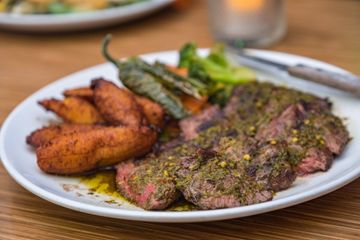Is Mexican Food Healthy And Balanced? Unpacking the Nutritional Perks of Traditional Components
The inquiry of whether Mexican food is healthy invites an exploration of its traditional active ingredients. Beans and corn serve as fundamental staples, abundant in healthy protein and fiber. Avocados provide useful fats, while various natural herbs and seasonings add flavor and health advantages - mexican food. With each other, these parts create a tapestry of nourishment. The healthiness of Mexican food often depends on prep work methods and part dimensions. What function do these elements play in establishing its total nutritional worth?
The Power of Beans: Protein and Fiber-Rich Staples
Frequently overlooked, beans serve as a cornerstone of Mexican cuisine, supplying a wide range of dietary advantages. Rich in protein, they are an excellent plant-based choice for those looking for to meet their nutritional healthy protein requires. This high healthy protein web content sustains muscular tissue repair service and development, making beans invaluable for both meat-eaters and vegetarians alike. Furthermore, beans are an outstanding source of nutritional fiber, which helps in digestion and promotes a feeling of volume, potentially assisting with weight administration.
The variety of beans used in Mexican meals, such as black beans, pinto beans, and kidney beans, adds to a varied flavor profile and can boost dishes nutritionally. Beans are reduced in fat and contain vital vitamins and minerals, including iron, folate, and magnesium. Together, these attributes make beans an important ingredient, supplying both nourishment and nutrition in typical Mexican fare.

Corn: a Versatile Grain With Nutritional Conveniences
Corn sticks out as a functional grain basic to Mexican food, celebrated not just for its culinary applications yet likewise for its remarkable dietary profile. As a key component in meals like tortillas, tamales, and pozole, corn offers important nutrients that add to a balanced diet plan. Rich in carbs, it works as a significant energy source, while also being reduced in fat, making it a positive option for numerous dietary requirements.
In addition, corn is an excellent source of dietary fiber, which assists in digestion and promotes satiation. It consists of considerable quantities of vitamins such as B-complex vitamins, which are necessary for power metabolic rate. The existence of anti-oxidants, especially carotenoids, contributes to general wellness by reducing oxidative tension. Furthermore, corn is gluten-free, providing to those with gluten sensitivities. Generally, the dietary benefits of corn highlight its importance in traditional Mexican food and its function in a healthy diet plan.
Avocados: Healthy And Balanced Fats and Nutrients in Every Bite
Avocados play a considerable function in Mexican food, matching recipes with their creamy appearance and abundant flavor. Beyond their cooking charm, avocados are commemorated for their outstanding dietary profile. They are a rich resource of healthy monounsaturated fats, which can help lower negative cholesterol levels and support heart wellness. Furthermore, avocados are packed with essential nutrients, consisting of potassium, vitamin E, and B vitamins, adding to total wellness.
The high fiber material in avocados help digestion and promotes satiety, making them a beneficial addition to any dish. Their one-of-a-kind nutrient make-up can additionally sustain skin health and wellness and give anti-inflammatory advantages. Integrating avocados right into conventional Mexican recipes or appreciating them as a standalone snack can enhance both flavor and nutrition, demonstrating why they are a cherished staple in Mexican cuisine. Overall, avocados provide a scrumptious way to enjoy healthy fats and critical nutrients in every bite.

Natural Herbs and flavors: Flavorful Health And Wellness Boosters
While delighting in the rich tastes of Mexican food, one can not overlook the necessary function that spices and herbs play in boosting both taste and health. Ingredients such as chili, oregano, and cilantro peppers not just add to the vivid flavor profile but also provide significant wellness benefits. Cilantro is understood for its cleansing buildings, helping to get rid of heavy steels from the body, while oregano is loaded with antioxidants and has anti-inflammatory results.
Chili peppers, a churros staple in numerous Mexican dishes, include capsaicin, which has been connected to boosted metabolism and discomfort relief. In addition, spices like cumin and coriander support food digestion and might assist in blood sugar level guideline. Incorporating these delicious wellness boosters right into dishes not only boosts the culinary experience yet likewise promotes total health, making Mexican cuisine not simply delicious, yet also nutritionally advantageous.
Traditional Food Preparation Techniques: Enhancing Nourishment and Taste
Standard cooking methods in Mexican cuisine play a crucial duty in boosting both nourishment and flavor, as they typically focus on fresh ingredients and classic strategies. Methods such as nixtamalization, where corn is soaked and cooked in an alkaline service, not just improve the nutrient profile of tortillas yet likewise enhance their digestibility - mexican food. In addition, making use of slow cooking methods, like stewing or braising, allows tastes to blend wonderfully while preserving the stability of the ingredients
Often Asked Questions
Are Mexican Food Portions Commonly Larger Than Various Other Foods?
Mexican food parts are commonly bigger than those of lots of various other cuisines. This particular reflects typical eating practices, emphasizing common sharing and hearty dishes, which can cause a much more substantial offering size in general.
Just how Does the Preparation Approach Affect Healthfulness of Mexican Food?
Preparation methods greatly affect the healthiness of Mexican food. Strategies such as cooking or steaming maintain nutrients, while frying can increase unhealthy fat material. Options of ingredients and cooking designs ultimately establish general nutritional value.
Can Mexican Food Be Customized for Specific Nutritional Restrictions?
Mexican food can indeed be tailored for details dietary restrictions. Replacements, such as using corn tortillas for gluten-free diets or integrating more vegetables, enable individuals to enjoy conventional tastes while fitting numerous nutritional demands.
What Prevail Misconceptions Concerning Mexican Food and Wellness?
Typical false impressions concerning Mexican food consist of the belief that it is inherently harmful, excessively zesty, and entirely focused on fats. Actually, conventional recipes commonly include healthy components and can be tailored to different dietary requirements.
Are There Healthier Choices at Mexican Dining Establishments?
Healthier choices at Mexican restaurants usually consist of barbequed meats, beans, and fresh veggies. Picking dishes that emphasize entire ingredients and staying clear of heavy sauces can bring about a much more nutritious dining experience, advertising general wellness.
The selection of beans used in Mexican meals, such as black beans, pinto beans, and kidney beans, adds to a diverse taste profile and can enhance dishes nutritionally. Avocados play a substantial function in Mexican cuisine, enhancing meals with their creamy appearance and rich taste. Including avocados into conventional Mexican recipes or enjoying them as a standalone snack can improve both taste and nutrition, demonstrating why they are a precious staple in Mexican food. While delighting in the rich flavors of Mexican cuisine, one can not ignore the crucial role that spices and herbs play in boosting both preference and wellness. Traditional food preparation techniques in Mexican food play a necessary role in improving both nourishment and flavor, as they usually focus on time-honored strategies and fresh ingredients.